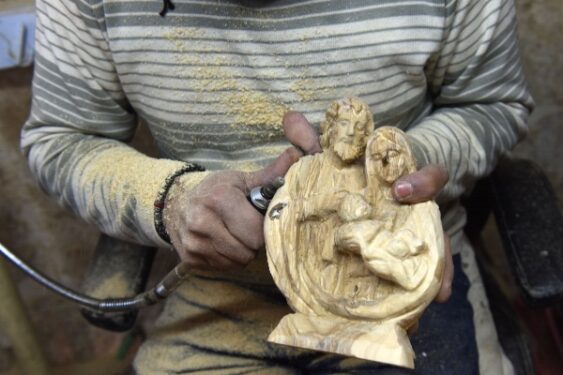
WINDSOR TERRACE — Bethlehem, the biblical birthplace of Jesus, continues to feel the economic impact of the pandemic since essentially shutting down on March 5, 2020. After a quiet Christmas season that featured toned-down Mass celebrations and empty streets and shops, the city hopes things will turn around by next year.
Tourism contributes significantly to the Palestinian economy in terms of employment and government revenues. Revenue generated from pilgrimages and the tourism industry normally creates thousands of jobs that support local communities. However, the “sudden and intense shock resulting from the pandemic” has affected the broader economy and created unemployment challenges, according to Palestine’s Ministry of Tourism and Antiquities.
Sales of olive wood items to Holy Land tourists once helped sustain local families’ and artisans’ livelihoods. However, fewer tourists have visited the area, due to violence in recent years and, currently, the pandemic.
Roni Salsa, executive director at Bethlehem Christian Families (BCF) and a board member of the Land of Peace charity organization, said his goal is to help those living in the Holy Land stay financially afloat. BCF, which is based in Pennsylvania, sends proceeds from the sales of hand-crafted pieces — made of olive wood by Bethlehem carvers — to organizations in Jerusalem and Bethlehem. Such olive wood pieces include rosaries, Nativity sets, crosses, and other religious figures.
“They told me that we are their only hope now because 80 percent of the population in Bethlehem depends on tourism,” Salsa said in reference to one of his recent phone calls with the Ministry of Tourism in Bethlehem. “Our whole mission has shifted from raising awareness about what’s happened to Christians living in the Middle East to helping fund our fellow Christians in whatever way we can — to support them and keep them working [as carvers].”
Before the pandemic, Salsa said BCF usually visited between 200 and 250 churches in a year, speaking about its mission and selling olive wood carvings to parishioners after weekend Masses. That number, he explained, has dropped at least 90 percent because BCF has only been able to visit about 20 churches since November 2020.
However, Salsa has noticed sales slowly getting better, compared to 2020, and placed an order with Holy Land artisans during the week of March 15. “Even though we have seen less attendance in churches, I think people have stepped up because they want to help their fellow Christians,” he said.
With that in mind, Salsa remains optimistic. “Last year was a disaster in every aspect,” he said. “This year we have seen some improvements, but hopefully, by the end of this year, we can go back to normal life.”
Salsa added, “We can see the light at the end of the tunnel.”
